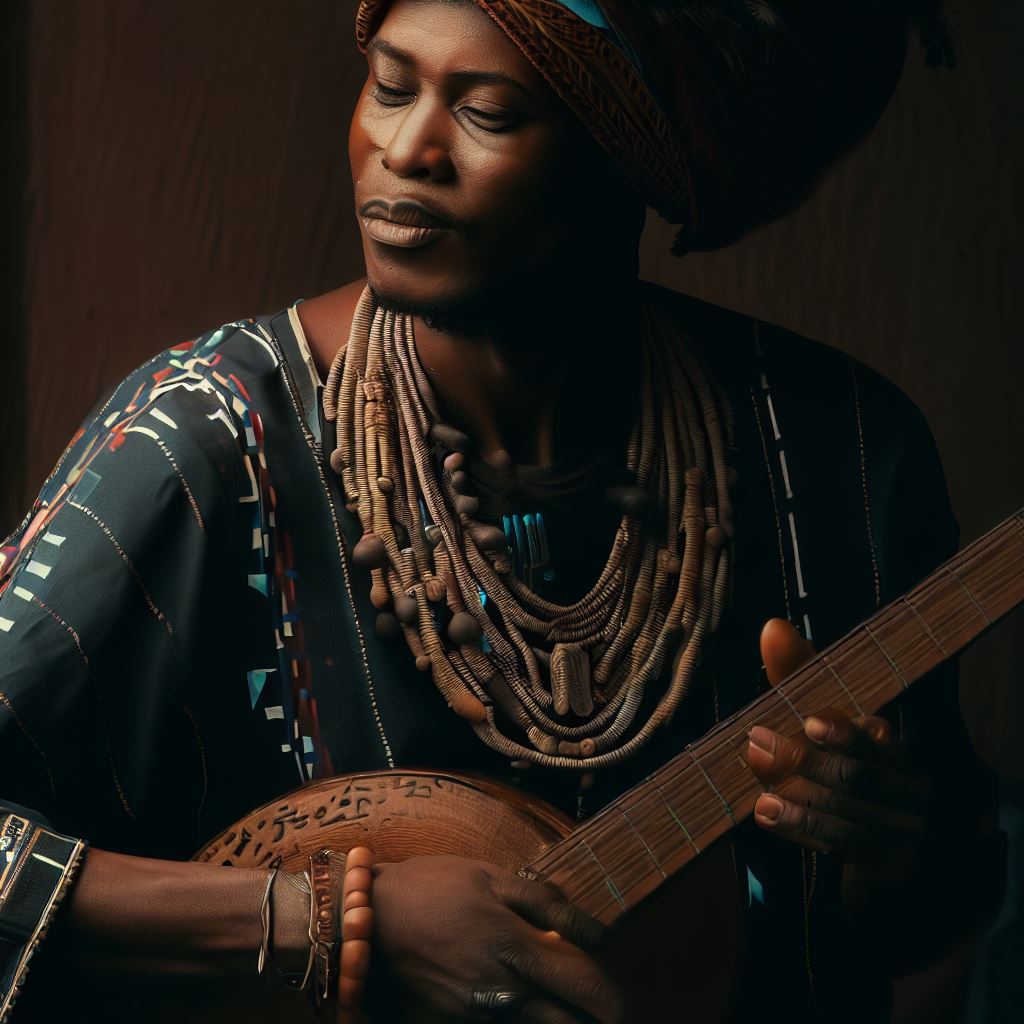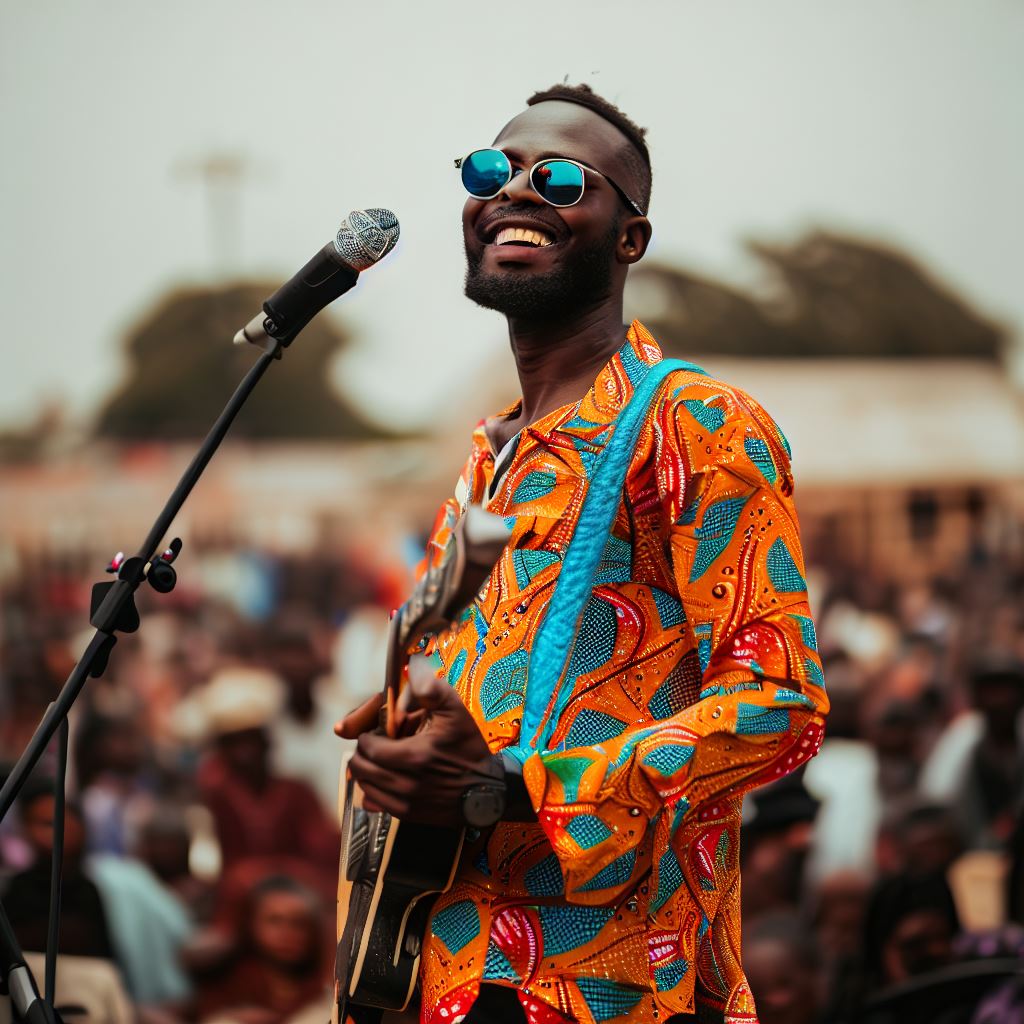Introduction
Nigeria’s indigenous language songwriting is a topic that holds immense cultural value.
In a world of universal music, diverse cultural expressions await discovery.
Nigeria, a country steeped in diverse traditions and vibrant heritage, boasts a treasure trove of indigenous languages that resonate with the heartbeat of its people.
This intricate mosaic of dialects has given birth to a unique form of artistic expression – Indigenous Language Songwriting.
This phenomenon not only encapsulates the essence of Nigeria’s linguistic diversity but also serves as a powerful vessel for storytelling, preserving age-old customs, and fostering a profound sense of identity among its citizens.
In this exploration, we embark on a journey into the heart of Nigeria’s musical landscape, delving deep into the mesmerizing realm of Indigenous Language Songwriting.
We shall unravel the intricacies of this art form, tracing its roots to the very core of Nigeria’s cultural heritage.
This blog post aims to offer insights into the fascinating world of Nigeria’s indigenous language songwriting.
Through this odyssey, we aim to uncover the stories, emotions, and traditions woven intricately into the lyrical fabric of these compositions, offering a unique glimpse into the soul of a nation.
Join us as we navigate through the harmonious intersections of language, culture, and music, forging connections that transcend boundaries and leave an indelible mark on the global musical landscape.
Importance of Indigenous Language Songwriting in Nigeria
Cultural significance of indigenous languages in Nigeria
- Nigeria is home to over 250 ethnic groups, each with its own distinct indigenous language.
- Indigenous languages are a crucial part of Nigeria’s rich cultural heritage and identity.
- These languages carry the traditions, histories, and values of their respective ethnic groups.
- Preserving and promoting indigenous languages is essential for maintaining cultural diversity and inclusivity.
- Indigenous languages are a vital communication tool within local communities, strengthening social bonds.
The role of music in preserving and promoting indigenous languages
- Music has long been a powerful medium for cultural expression and preservation in Nigeria.
- Indigenous language songwriting allows musicians to harness the beauty and nuances of their native tongues.
- By incorporating indigenous languages into their music, artists can keep these languages alive and relevant.
- Indigenous language songs serve as a bridge between generations, passing on linguistic knowledge and heritage.
- Music has the ability to captivate and engage audiences, making it an effective tool for language revitalization.
The impact of indigenous language songs in fostering unity and national pride
- Indigenous language songs have the ability to unite Nigerians across various ethnic backgrounds.|
- These songs celebrate shared values and traditions, fostering a sense of national pride and identity.
- By embracing and promoting indigenous languages, Nigeria can showcase its cultural diversity to the world.
- Indigenous language songs often address social and political issues, encouraging critical thinking and reflection.
- Through music, Nigerians can connect with their roots, fostering a sense of belonging and cultural empowerment.
In short, indigenous language songwriting plays a vital role in Nigeria by preserving cultural heritage, promoting linguistic diversity, and fostering a sense of unity and national pride.
Indigenous languages carry the values, traditions, and histories of Nigeria’s diverse ethnic groups, making their preservation essential.
Music serves as a powerful tool for language revitalization, allowing artists to incorporate indigenous languages into their songs and pass on linguistic knowledge to future generations.
Furthermore, indigenous language songs have the ability to bring Nigerians together, celebrating shared values and promoting a sense of national identity.
By embracing and promoting indigenous languages, Nigeria can showcase its rich cultural diversity and empower its citizens culturally.
Indigenous language songwriting in Nigeria must be valued and supported to ensure the continued preservation of the nation’s linguistic heritage.
Read: The Impact of Western Styles on Nollywood Hair Design
Traditional Themes and Styles in Nigerian Indigenous Language Songwriting
Common themes found in indigenous language songs, such as love, folklore, heritage, and social issues.
Nigerian indigenous language songs often reflect the nation’s cultural richness and traditions through common themes.
Love, folklore, heritage, and social issues serve as the foundation for these songs, incorporating the essence of Nigerian life and its people.
Love is a recurring theme, explored in myriad ways.
It can express romantic love between two individuals, family love and bonding, or even love for one’s country.
These songs beautifully capture the emotions and complexities of love, making them relatable and compelling to the listeners.
Folklore is another significant theme in indigenous language songs.
Nigerian folklore is a treasure trove of captivating stories and mythical creatures.
Artists often draw from these folktales to create songs that not only entertain but also preserve cultural heritage.
This fusion of music and storytelling keeps the essence of tradition alive in contemporary Nigerian music.
Heritage is an essential aspect of Nigerian indigenous language songwriting. These songs celebrate and honor the diverse cultures and ethnicities within the country.
They act as a gateway to understanding and appreciating the richness of Nigeria’s history and multiculturalism.
By incorporating elements of traditional music styles and languages, these songs convey a sense of pride and unity.
Social issues form a significant part of indigenous language songs. Artists use their music as a platform to shed light on pressing societal problems.
These songs often tackle issues such as poverty, corruption, inequality, and injustice.
Through powerful lyrics and soulful melodies, artists aim to promote social change and inspire listeners to take action.
Various musical styles and genres used in indigenous language songwriting, such as highlife, juju, fuji, and afrobeats.
Indigenous language songwriting in Nigeria encompasses a wide range of musical styles and genres, each with its unique characteristics and influences.
These styles have evolved over time, shaping the sound of Nigerian music.
Highlife, a popular genre since the 1920s, blends elements of traditional indigenous music with Western influences.
It features a combination of indigenous instruments, like the palm wine guitar, and Western instruments such as the trumpet and saxophone.
Highlife is known for its infectious rhythms and melodic guitar lines, creating a lively and danceable sound.
Juju, which originated in the 1930s, is characterized by the use of the talking drum, electric guitar, and accordion.
It blends traditional Yoruba music with Western influences, creating a unique and groovy sound.
Juju music often tells stories, and its energetic rhythms make it popular for social gatherings and celebrations.
Fuji music, developed in the 1960s, is deeply rooted in Islamic traditions and Yoruba culture.
It features the use of traditional instruments like the tambourine, drums, and vocals. Fuji songs are often catchy and upbeat, encouraging audience participation through call-and-response chants.
Afrobeats, a more recent genre, gained international recognition in the 2010s.
It combines elements of highlife, Fuji, hip-hop, and R&B, creating a fusion of modern and traditional sounds.
Afrobeats has a strong emphasis on rhythm and catchy melodies, often addressing contemporary social issues with a mix of Nigerian languages and English lyrics.
Examples of renowned Nigerian artists who specialize in indigenous language songwriting.
Nigeria boasts a plethora of talented artists who specialize in indigenous language songwriting, carrying the torch of Nigerian music heritage.
King Sunny Ade, often referred to as the “King of Juju Music,” is a pioneer in the genre and has been influential both in Nigeria and globally.
His unique blend of juju music, storytelling, and energetic live performances have earned him critical acclaim and a massive following.
Chief Ebenezer Obey, another legendary Nigerian artist, is known for his mastery of juju music.
His songs often carry moral and social messages while maintaining an infectious rhythm that resonates with diverse audiences.
On the contemporary front, Burna Boy has made a significant impact with his fusion of afrobeats and indigenous sounds.
His music portrays a mix of English, Pidgin English, and Nigerian languages, addressing social issues and celebrating Nigerian culture.
Yemi Alade, widely recognized as the “Empress of Africa,” incorporates indigenous languages like Yoruba, Igbo, and Swahili into her music.
With her powerful voice and energetic performances, she has become a symbol of African pride.
Generally, these examples represent just a fraction of the incredible talent within Nigerian indigenous language songwriting, and their contributions continue to shape and evolve the music scene in Nigeria.
Read: Nigerian Film Hair Stylists: Pioneers in African Cinema

Lyrics and Poetry in Indigenous Language Songwriting
- Poetic Aspects of Indigenous Language Songwriting.
- Indigenous language songwriting demonstrates a deep understanding of the poetic form.
- The lyrics embrace the rhythmic patterns, rhyming schemes, and repetition often found in indigenous poetry.
- Indigenous songwriters carefully craft their words to create a musical journey for the audience.
- The poetry in these songs reflects the rich cultural heritage and history of the indigenous community.
- Through song, indigenous language writers preserve and pass on their traditional poetry to future generations.
The Rich Imagery, Metaphors, and Storytelling Techniques Employed in These Songs
- Indigenous language songwriting is known for its vivid imagery, capturing the essence of nature and everyday life.
- Metaphors are frequently used to convey deeper meanings and evoke powerful emotions.
- These songs often incorporate storytelling techniques, drawing listeners into narratives that explore different aspects of life.
- Historical events, legends, and cultural beliefs are often intertwined with contemporary themes, creating a rich tapestry of storytelling.
- The use of vivid imagery, metaphors, and storytelling techniques makes indigenous language songs captivating and memorable.
Emotional Impact and Ability of Indigenous Language Songs to Connect with Listeners on a Deeper Level
- Indigenous language songs have a profound emotional impact on listeners.
- The authenticity and rawness of emotions expressed in these songs resonate deeply with the audience.
- Indigenous language songs connect listeners to their roots, culture, and heritage, fostering a sense of belonging and pride.
- The inclusion of indigenous languages in the songs adds another layer of emotional connection for those who understand and speak the language.
- The power of indigenous language songs lies in their ability to evoke emotions, inspire reflection, and promote cultural preservation.
In general, the poetic aspects of indigenous language songwriting, including rich imagery, metaphors, and storytelling techniques, contribute to the emotional impact and ability of these songs to connect with listeners on a deeper level.
Indigenous language songwriters demonstrate a deep understanding of the poetic form, incorporating traditional poetic elements into their lyrics.
Through their songs, they preserve and pass on traditional poetry, capturing the essence of their culture and connecting listeners to their roots.
Lastly, the emotional authenticity expressed in these songs resonates with audiences, fostering a sense of pride and belonging.
Indigenous language songs have an undeniable power to evoke emotions, inspire reflection, and promote cultural preservation.
Read: Navigating Challenges: Songwriting in Nigeria
Challenges and Opportunities for Indigenous Language Songwriters in Nigeria
Challenges faced by indigenous language songwriters, such as a declining interest in traditional music and the dominance of Western-influenced music
- Indigenous language songwriters in Nigeria face challenges due to the declining interest in traditional music.
- The dominance of Western-influenced music has also affected the recognition and popularity of indigenous language songs.
- Many aspiring songwriters are attracted to the modern music trends, leading to a neglect of their cultural roots.
- The lack of exposure and platforms to showcase indigenous language songs further exacerbates the challenges faced by songwriters.
- Limited financial support and resources make it difficult for indigenous language songwriters to produce and promote their music.
Opportunities available for indigenous language songwriters to showcase their talent through technology, social media, and cultural festivals
- Technology has opened doors of opportunities for indigenous language songwriters by providing affordable recording equipment.
- Social media platforms enable songwriters to reach a wider audience and gain recognition beyond their immediate surroundings.
- Digital music streaming platforms allow indigenous language songs to be distributed worldwide, creating a global audience.
- Cultural festivals serve as platforms for indigenous language songwriters to showcase their talent and connect with a diverse audience.
- Collaborations with mainstream artists interested in promoting cultural diversity provide exposure and recognition to indigenous language songwriters.
Efforts being made to support and promote indigenous language songwriters in Nigeria
- Government agencies and cultural organizations offer funding and grants to support indigenous language songwriters.
- NGOs and music initiatives organize workshops and training programs to enhance the songwriting skills of indigenous artists.
- Radio stations and local TV networks are encouraged to play more indigenous language songs to promote their appreciation.
- Music competitions and talent shows specifically designed for indigenous language songwriters offer platforms for exposure and recognition.
- Educational institutions have started incorporating indigenous language music into their curriculum to preserve and promote the cultural heritage.
In brief, indigenous language songwriters in Nigeria face challenges due to declining interest in traditional music and the dominance of Western-influenced music.
However, opportunities through technology, social media, and cultural festivals provide platforms for showcasing their talent.
Efforts made by organizations, government agencies, and educational institutions aim to support and promote indigenous language songwriters, preserving their cultural heritage while fostering their artistic growth.
It is crucial to continue nurturing and celebrating indigenous language songwriting to ensure the diversity and richness of Nigeria’s musical landscape.
Read: Innovative Hair Techniques in Nigeria’s Film Industry
Conclusion
In this blog post, we have explored the insights into Nigeria’s indigenous language songwriting.
The significance of indigenous language songwriting cannot be overstated in preserving Nigerian culture and promoting national identity.
We encourage readers to take the time to explore and appreciate the beauty of Nigerian indigenous language songs and support indigenous language songwriters.
Basically, indigenous language songwriting in Nigeria plays a vital role in preserving the rich cultural heritage of the country.
These songs serve as a medium through which traditions, values, and stories are passed down through generations.
They provide a deeper understanding of Nigerian history, identity, and the diverse ethnic groups that make up the nation.
By promoting the use of indigenous languages in songwriting, we ensure that these languages remain alive and vibrant.
This, in turn, enables future generations to connect with their roots and embrace their identity.
We urge readers to actively seek out and listen to Nigerian indigenous language songs.
Through their melodies, lyrics, and emotions, these songs offer a unique insight into the country’s cultural richness.
In summary, by supporting indigenous language songwriters, we contribute to the preservation of Nigeria’s cultural heritage and encourage the growth of the music industry.
Let us celebrate and appreciate the beauty of Nigerian indigenous language songs together.




